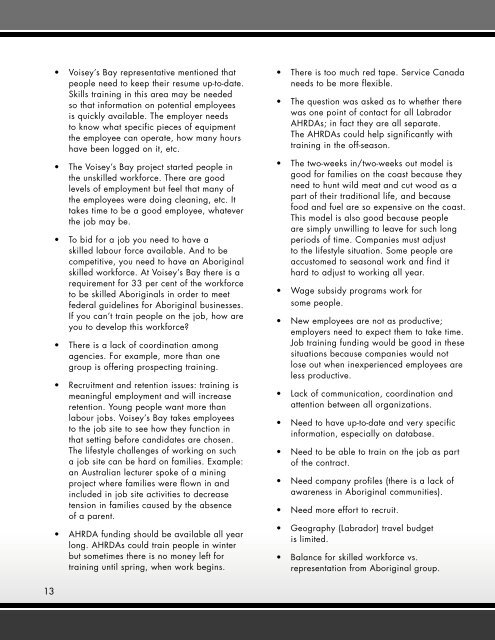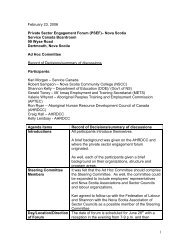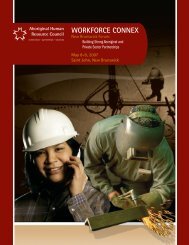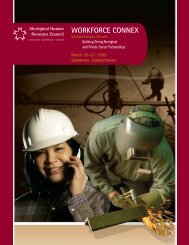Labrador - Aboriginal Human Resource Council
Labrador - Aboriginal Human Resource Council
Labrador - Aboriginal Human Resource Council
Create successful ePaper yourself
Turn your PDF publications into a flip-book with our unique Google optimized e-Paper software.
• Voisey’s Bay representative mentioned that<br />
people need to keep their resume up-to-date.<br />
Skills training in this area may be needed<br />
so that information on potential employees<br />
is quickly available. The employer needs<br />
to know what specific pieces of equipment<br />
the employee can operate, how many hours<br />
have been logged on it, etc.<br />
• The Voisey’s Bay project started people in<br />
the unskilled workforce. There are good<br />
levels of employment but feel that many of<br />
the employees were doing cleaning, etc. It<br />
takes time to be a good employee, whatever<br />
the job may be.<br />
• To bid for a job you need to have a<br />
skilled labour force available. And to be<br />
competitive, you need to have an <strong>Aboriginal</strong><br />
skilled workforce. At Voisey’s Bay there is a<br />
requirement for 33 per cent of the workforce<br />
to be skilled <strong>Aboriginal</strong>s in order to meet<br />
federal guidelines for <strong>Aboriginal</strong> businesses.<br />
If you can’t train people on the job, how are<br />
you to develop this workforce<br />
• There is a lack of coordination among<br />
agencies. For example, more than one<br />
group is offering prospecting training.<br />
• Recruitment and retention issues: training is<br />
meaningful employment and will increase<br />
retention. Young people want more than<br />
labour jobs. Voisey’s Bay takes employees<br />
to the job site to see how they function in<br />
that setting before candidates are chosen.<br />
The lifestyle challenges of working on such<br />
a job site can be hard on families. Example:<br />
an Australian lecturer spoke of a mining<br />
project where families were flown in and<br />
included in job site activities to decrease<br />
tension in families caused by the absence<br />
of a parent.<br />
• AHRDA funding should be available all year<br />
long. AHRDAs could train people in winter<br />
but sometimes there is no money left for<br />
training until spring, when work begins.<br />
• There is too much red tape. Service Canada<br />
needs to be more flexible.<br />
• The question was asked as to whether there<br />
was one point of contact for all <strong>Labrador</strong><br />
AHRDAs; in fact they are all separate.<br />
The AHRDAs could help significantly with<br />
training in the off-season.<br />
• The two-weeks in/two-weeks out model is<br />
good for families on the coast because they<br />
need to hunt wild meat and cut wood as a<br />
part of their traditional life, and because<br />
food and fuel are so expensive on the coast.<br />
This model is also good because people<br />
are simply unwilling to leave for such long<br />
periods of time. Companies must adjust<br />
to the lifestyle situation. Some people are<br />
accustomed to seasonal work and find it<br />
hard to adjust to working all year.<br />
• Wage subsidy programs work for<br />
some people.<br />
• New employees are not as productive;<br />
employers need to expect them to take time.<br />
Job training funding would be good in these<br />
situations because companies would not<br />
lose out when inexperienced employees are<br />
less productive.<br />
• Lack of communication, coordination and<br />
attention between all organizations.<br />
• Need to have up-to-date and very specific<br />
information, especially on database.<br />
• Need to be able to train on the job as part<br />
of the contract.<br />
• Need company profiles (there is a lack of<br />
awareness in <strong>Aboriginal</strong> communities).<br />
• Need more effort to recruit.<br />
• Geography (<strong>Labrador</strong>) travel budget<br />
is limited.<br />
• Balance for skilled workforce vs.<br />
representation from <strong>Aboriginal</strong> group.<br />
13









